#and if their romance was more.... developed
Explore tagged Tumblr posts
Note
I have no idea if requests are open or not so forgive me if they’re closed but could I request like making out with the Saja boys and how that would go? If that’s too much then putting makeup on them🙏🙏
LIPS HIPS KISS ─── saja boys. suggestive. gn¡reader.

𖥔 ݁ ˖ JINU SAJA
making out with jinu feels like the end of the world. he's a good kisser. why wouldn't he be when he's at least four centuries old? he's had his fair share of experiences that he has learned from. soft lips, smooth skin, tantalising eyes. and his magical hands that has you melting beneath his touch.
jinu holds your face, the back of your neck, or wherever that he could keep you locked in your spot with absolutely no where to run. his lips moved against yours so softly at first— testing the waters. but when you reciprocated, it gets bolder and heated until he could feel both your bodies growing hot, pushing you so close to him you could feel his chest against yours and the growing arousal from below.
he's the type to make out with you after the mood is set, or whenever he needs reassurance. french kisses seemed to be his favourite. he loves the way your lips perfectly moulds against his. kisses like these often leads to comforting cuddles, not very often does it progress into something more heated. he likes keeping it romantic. but when it does get heated, his hands will be under your shirt or beneath your waistband by now.

𖥔 ݁ ˖ ABBY SAJA
likes your hand all over his chest when you two make out. it's common to hold onto something to keep the connection going, isn't it? so he always wants your hand on him, roaming all over and feeling his muscles hardening under your touch. it sends fire straight to his core, making him breathe so very heavily into you.
abby heavily fancies rough kisses. ones where it's dominating, controlling, and guiding. this man leads every kiss and every single initiation. he wants to execute, not feel. never much of a feeler. abby only seek to please you and make you feel good. his kisses are a simple start.
while your hands are all over his chest, his hands in return are all over your hips and waist and under your shirt. touching and feeling your skin, simply by brushing his thumb against your hips is enough for him. abby will also make out with you literally anywhere. the underworld if you're a demon, social meetings, meet and greets, at the back lane, anywhere. he could never get enough of the taste of your sweet lips.

𖥔 ݁ ˖ ROMANCE SAJA
make outs with romance always end up with his hands on your hips, guiding you to rock your hips against him. no kidding. no shit. no lies. his heavy breathing and the way he holds the back of your head contains a lot of affection, and you can tell by the way he always starts off cheesy and romantic.
but oh, how silly of you to think that sweet kisses couldn't develop into something such as grinding against the obvious arousal in his pants while you feel your own arousal build up. he's a big tease with it. always getting you all hot and bothered but never doing more than that. you know you get him all worked up as well. besides getting aroused sexually, you annoyance from the teasing also gets aroused.
that's okay though. romance likes it when you're all angry and taking control instead when he's became your thirteenth reason in this push and pull. if i hadn't made it obvious yet, he likes you sitting on his lap and looking up at you with that stupid smirk and devilishly handsome face. he's also the type to also nip at your bottom lip.

𖥔 ݁ ˖ BABY SAJA
super big fan of brushing your bottom lip before kissing you or even in the middle of kissing. that was your foreplay before sex, if we're speaking through incoherent metaphors. he finds your lips absolutely pleasing to touch or simply kiss. and suck. oh, how much he adores sucking and then licking your bottom lips. only bottom by the way.
baby is the type of man who wants to taste your whole mouth as if they're potent enough to cover the taste of spicy sauces. exploring your mouth is a normal thing when you make out with him, his hands cradling your cheek just as his thumb gently brushes against your lips.
often times tongues are involved, so there weren't any exceptions. in fact, tongues are a must. you can't even tell if he's teasing you or not. but it makes the kiss heated and to die for. after several minutes of making out, baby yearns to leave his marks on the skin of your neck. he goes down your collarbone, your chest, and your lower abdomen until he reaches his favourite place to kiss.

𖥔 ݁ ˖ MYSTERY SAJA
loud, noisy, and absolutely pathetic. not in a bad way, in a good way to signify to you that he enjoys making out with you. like the rest, mystery will heavily breath into you as he kisses you. only this time with him, this man will emit sounds from the depths of his throat which you swallow.
he whimpers when you touch him, whines when you pull away for air, moans when he himself gets rougher with the kisses. he's so touchy and needs you to touch and hold him. which shocks you, because mystery is so quiet that the thought of him being noisy during heated moments such as these could happen. not that you're complaining though.
him being a yearner makes you feel like a wobbly jelly. maybe even because you get to lead the kiss and do whatever you want to him. he's the type to crumble under one touch from you and become the pillow princess. you have mystery wrapped in your fingers and. he loves being in your chokehold. you might get a few bit marks on your lips with his much mystery digs his teeth into your lips by mistake and pure excitement though.

note. oops i went overboard with this one uhh yay! this one's for you, @skriblobz, happy early wedding day to you and rafayel LMFAOOO
© SENEON 2025 ♱ do not repost, alter, or translate.
#﹙🗝️ .𖥔 ݁ ˖ 𝐰𝐫𝖎𝐭𝖎𝐧𝐠﹚#kpop demon hunters#kpop demon hunters x reader#kpdh#kpdh x reader#kpdh x you#kdh#kdh x reader#saja boys#saja boys x reader#kpdh saja boys#kdh saja boys#jinu saja#abby saja#romance saja#mystery saja#baby saja#jinu x reader#abby x reader#romance x reader#mystery x reader#baby x reader#saja boys x you#saja boys headcanons#kpdh headcanons
688 notes
·
View notes
Text
maybe i actually just hate so many critical takes on taming of the shrew. i’m not denying that this play can be performed AND read as containing a genuine romance—petruchio and katherine have the stichomythic banter that tends to signal chemistry in other plays, and of course one can decide how much katherine is playing along with him out of delight—but i feel about this play the way dara horn feels about the merchant of venice, that being “why does it feel like the entire world is trying to convince me that calling a bigoted play a bigoted play is the resort of the un-academic idiot?” “Staring into my phone, I sank into my own insecurity, which took the form of a belief that centuries of Shakespearean scholars, and Shakespeare himself, must surely know more than I do.”
and i do think that “this is bigoted” can be used to shoo away discussion. calling taming misogynistic (or merchant antisemitic) strikes me as a better start than end—that assertion opens up a new conversation about how bigotries form and solidify over time, how shakespeare might (might!) have tried (and failed?) to subvert them, where these plays echo our modern day and where they don’t, what we can learn from them, and perhaps most importantly how we handle the idea of one of the Greatest Writers Of All Time™️ creating something that contradicts our values? but some of the abstracts i’ve read about this play seem to bend backward to avoid coming within ten feet of the word or concept of “abuse.” if you are going to argue that petruchio is “inviting katherine into a private world” between the two of them, that he is “playing language games,” that he is helping her “develop her imagination” and “navigate chaos” when he deprives her of food and sleep while constantly contradicting her perception of basic reality—well, god help you, go ahead and write it and cite your line references! but you might just want to acknowledge that you have heard of spousal abuse and gaslighting, just, like, discreetly the once, even if you’re arguing that that isn’t what this is, because if you can’t recognize that conversation about this play should Say Those Terms, then you might as well try to write about hamlet without using the words madness, mental illness, or suicide! and what have i got to take you seriously for!
#max.txt#am i making sense.#the hamlet comparison is the best one i have because you don’t have to argue that hamlet is Mentally Ill in the way we recognize#in fact you can easily argue that his deal is entirely situationally dependent. i disagree but you can do it#but if you can’t even acknowledge that that is A Topic Related To Hamlet. then what#anyway blame this post on harold bloom but also on a lot of literature review type stuff i have seen about this play#which. like. i’m going to be crude:#ppl saying petruchio is playing ‘language games’ or that his intimidation doesn’t directly affect katherine or; like harold; that he seems#that he seems to enter a state of ‘paranoid mania’ (suggesting he got carried away rather than escalated on purpose)#is like. ohhhhh. i get it. none of you have ever experienced very basic gaslighting. another win for My Genius#taming of the shrew
164 notes
·
View notes
Text
Zoanne Is The Most Underrated Tim Drake Side Character Ever
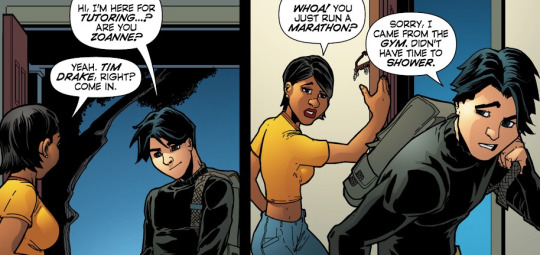
Most of Tim's side characters are either super simple, and likable, totally forgettable, or hit or miss, or just not built to last.
But with Zoanne, I've always really liked her. She was written to represent something in Tim's story, instead of being simple background dressing. She feels like someone that does her own thing when Tim's not around, instead of despawning like a video game NPC. And adds way more than simply mild amusement.
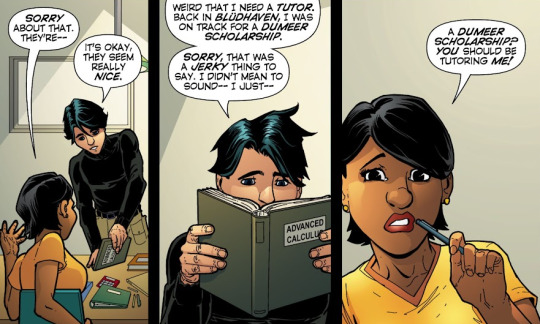
And her positioning within Tim's life is also great ground for character work. Something a great side character should be able to do.
Like in this instance giving Tim someone to ground himself, while his life is growing more abnormal thanks to being adopted by Bruce. Most writers would've elected to have Tim get a more weird life--
Remember that weird arc where Tim faked an Uncle to avoid being adopted despite seeming excited at the idea Bruce wanted him to be around like that--?
Was a bit hokey, though I know it has it's fans, but for me it felt a little out of character, a little too done purely for fun, and not a good accurate portrayal of the character. I like my stuff character driven and fun, not just--nonsense.
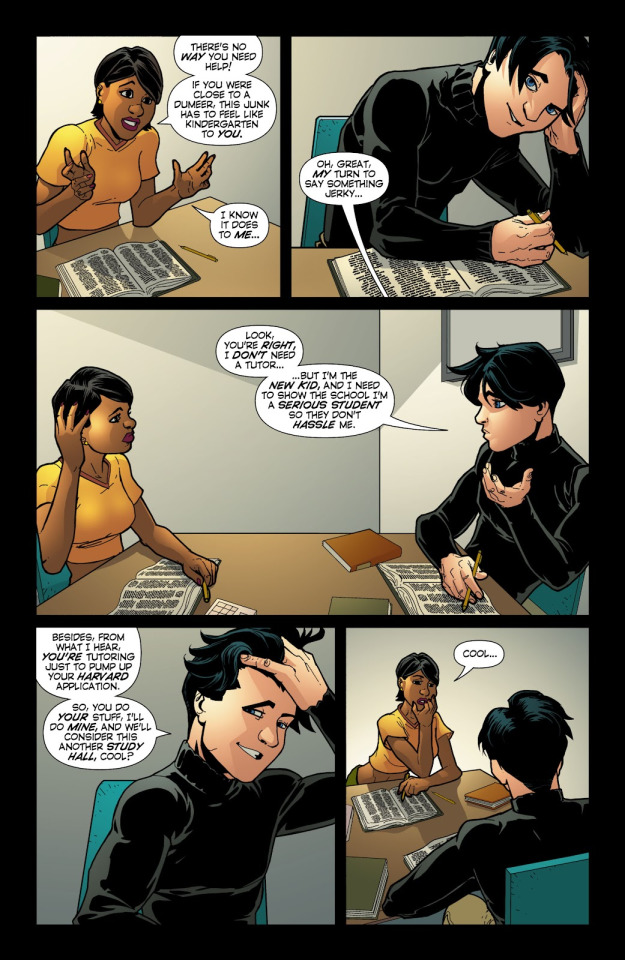
The writing feels natural and real. You get to see more of Tim's personality. He's smart, but he's not someone who thinks he's special. This is a trait that's even been identified in Tim by people in editorial in old 90s DC Comics when Tim was still being developed. So it's a very purposeful character choice.
He has his moments of showing off like anybody, especially a kid. However when not caught up in the moment, he's extremely humble. Though, socially stumbles at the same time. He's still a bit awkward around the edges. Social, but not entirely natural.
Remember also Tim wanted to go to a normal public school close to the beginning of his introduction as a character. If you read his origin and early issues in his newly formed time as a Batman character he was still in boarding school. Tim wanted to go to public school though. Tim is someone who loves to feel grounded despite his privlages.
And he's putting in the effort to maintain that despite his new semi-celebrity status as the newly adopted son of Bruce Wayne. It's his whole purpose of being here. Tim's a proactive character in his story, not reactive. He wanted to be tutored despite not needing it. Which helps him remain interesting, wondering what he'll be up to next.
And he lifts Zoanne's spirits up, because he's such a good hearted person. Like a natural extension of who he tries to be for Batman but applied to someone else in a less major way. Making it an interaction specifically something Tim Drake would do, instead of a measly generic interaction to build up a boring romance.
No, it's character work all the way through. Tim never stops being Tim, because the writer got lazy, like what happens under other writers. He's still showing who he is as a person the entire scene.
Heck, the first panels I showed where Tim has to come up with an excuse for smelling bad, is just fun work to be had with him being a kid crime-fighter. Small, but there, and very fun.

Zoanne's also very likable, so is her family. Feels like it could be your own family or the family of a friend. It deepens her own character as well.
How many Tim Drake side-characters have we actually got to see their family well-enough to know their own personalities? Ariana? There's not a lot. Which makes you want to see Zoanne again too. She's a side-character, yes, but she still feels like her own person. Which makes her more memorable and likable. That's a strong thing to get from a side-character, who are often bottom of the barrel in terms of characterization.
I've read the entire Robin series many times, and I couldn't tell you the name of all the side-characters, or describe their families to you.
I can with Zoanne, though.
She's someone who definitely should've came back by now. I think she's the greatest side-character Tim has ever had, and should be more beloved by the fandom.
If only she lasted longer and wasn't thrown away by one of the next writers--
69 notes
·
View notes
Text
Somewhere in nyc with you (and my gun under our pillows) ᥫ᭡.



sweet starter pack of post-re4!leonkennedy in the city with receptionist!reader ...
tw ; mention of guns, not in detail though !
word count ; 2.7K
genre ; head cannons , fluff
this is my first ever piece on tumblr! omg! i'm sososo excited and i hope you enjoy the start of this little universe i've created for leon and you ᥫ᭡.
enjoyyyy !

• after returning from spain and back to HQ in the big city, it took leon time to adjust back into his shitty little broken apartment in nyc
• his first day back is filled with looks of admiration, words of congratulations, and the women of the workplace all over him.
• and leon's a tired soul, he hates all the attention and questions, but he deals with it anyway.
• it wasn't until a few days into being back he met you, though.
• and was he glad he did.
• they had a new security detail which required him go to the opposite end of the building to sign off some papers at the reception down there, and, albeit reluctantly, he made the trip.
• but when he saw you? his attitude changed up very quick.
• now leon never had very much confidence in himself (poor baby) but over the years he'd gotten better at masking that fact
• he can't believe you're a receptionist with how beautiful and intriguing you look, almost like you're meant for more, not somewhere as harsh as this world, as harsh as him.
"hello sir, is there something I can help you with?"
• what can't you help him with...
"...here to sign off security clearance papers for leon kennedy."
• leon speaks in a very low and monotone voice, a voice that's been round the bend a few times. leon doesn't mean to be so passive and closed off, but he's never been into too much socialising, especially anything to do with work politics.
• you hand him the papers sweetly, a soft smile on your face before you commit back to your computer and answering calls, but leon's so caught up in you that he can't help but blurt out:
"go out with me."
• leon's a direct and blunt man, it's a yes or a no.
• you look at him, eyes wide and brows furrowed as you let out a noise of confusion while still on the phone
• the minute you don't give him an answer, he walks off, like he doesn't care
• but oh, this boy cared big time.
what did i say that for?
fucking idiot leon!
well done loser.
• from there, he made the ultimate decision that he would never come to that part of the building again and would avoid you like the plague at all cost.
shit.
he left the fucking papers.
in the awkward beginnings ...
• he manages to avoid the lobby for two. whole. weeks. he takes the stairs instead of the lobby lift, sends interns to run his day-to-day errands, redirects email deliveries from the reception straight to him...you started to think this man hated you.
• unfortunately for him, the security system starts to update weekly, and the only person authorised to update security clearance? you.
• he considers transferring departments. legitimately considers it. he gave up after finding that the paperwork is too much, even for him. he hates paperwork.
• he tries what he believes are subtle (but more so stupid and painfully obvious) attempts to get close to you once he does start coming back to the lobby, in an attempt to try and fix things (despite there being nothing he actually has to fix since you both had nothing in the beginning but oh well)
• he finds every excuse to ask you a question just to hear your voice. 'needed a pen.' my clearance badge has bent.' 'did i leave my tactical gloves here?' the excuses get more and more frequent, like, ten times a day and you start to catch on.
(p.s. he bent the clearance badge himself.)
• it's just because he doesn't really always know what to say. often times he doesn't realise he's doing it until you look up and catch him, to which he quickly averts his eyes to a plant or painting.
• develops a staring problem. not to be creepy,it's just his deeply repressed feelings of romance that he squashed deep beneath his surface that are forcing there way out due to his attraction for you.
• he leaves things on your desk anonymously. it starts off with small gestures - an energy bar and a drink of water after he hears you missed breakfast. a cup of your morning beverage that's your exact order. a pile of files you would've had to walk half way across the building to collect.
• you get an inkling it's him, from the way he watches from the sofas in the lobby in anticipation of you seeing what he's left, but you never call him out for it, and he's painfully grateful for that.
• one day, he's doing a daily walk past your desk just to get a glimpse of you before a long meeting he really could wait for, when he sees someone else flirting with you - a man he's never seen before who has actual charisma.
• you're too smart for this random guy, you're too out of this world for this guy. who is he?
• leon was definitely looking this guy up in the database later.
• due to his previously stated staring problem, leon walks right into glass door while trying to get a better look at you and the man, which earns looks from all people near him, including you.
• but you smile, and make a mental note to ask for his number.
the talking stage (if you could even call it that) ...
• leon would hate that it's called 'a talking stage' when a friend of his let's him know about the world of talking to girls. it's weird. only a stage? it feels temporary.
• he doesn't want it to be just temporary with you.
• you send the first message in the evening, at around ten pm, which is lucky, because it was taking leon hours to decide whether he should message first or not.
"put the files on your desk for your next mission on your desk for you!"
• leon then spends at least 10 minutes deciding if 'thanks' should have a full stop or not.
• his texts are super dry.
"EOD has been pushed back. let downstairs know."
"Okay."
"Sure."
• he rewrites them all multiple times, and always feels stupid once he's sent them.
• the first time she sends a smiley emoji? it's like he's staring at a foreign object. he didn't even know you could do that.
• when you start talking more, he can never pull his eyes away from his phone. he starts to spiral when you don't respond within minutes.
"did you see my last message"
"just checking."
"forget it."
"never mind."
"sorry."
• he regrets it all and goes dark for at least twelve hours out of embarrassment.
• after a while, he starts walking you to the subway after work. even though he lives in the complete opposite direction and it would be an hours walk back, he doesn’t care. prefers to look after you instead.
• and if it starts raining one night he’d definitely give you his jacket
• and if you’re not feeling up to walking one night because you’re tired, you don’t feel safe or leon can’t walk you? he’s ordering you a taxi, on him.
• he starts to grow obsessed with getting you flowers, like, all the time. one time walking to work he sees a florist and impulsively buys you some small white lillies and drops them off at the reception before you get in for the morning.
• at the end of the day, when you’re in a meeting, he comes down to the reception to check with your co worker that you did get the flowers. this becomes a religious routine, which you absolutely love.
• your conversations at the front desk in the morning, on breaks, and at end of day get longer and more frequent.
• he notices all the little things about you, down to your earrings. one day you change up what ones you wear, opting for a slightly bigger hoop that day.
“you changed your earrings.”
“…oh! yea…they okay?”
“of course they are, they’re…yea, they’re pretty.”
• he gets sweeter with his texts, more caring and more comfortable. he’s always checking in.
“you home safe?”
“rain was heavy, did you get the subway okay?”
“fixed the downstairs printer so you don’t have to walk far.”
• you have a certification exam one day, which you’d mention to leon very briefly a week or so ago. and leon takes notice, and he makes sure to let you know.
“good luck tmrw”
“thx leon! didn’t think you’d remember”
“of course I would.”
and finally, he asks you out …
• took him long enough. it was a simple moment, you had both stayed behind late to finish paperwork, and had ordered chinese takeout which was spread across a meeting table in one of the meeting rooms.
• he kept trying to ask, but the words got stuck in his throat.
“…so, ehem…we- well…”
“what is it?”
“…wanna go out with me?”
“…yea, I would.”
“okay…grrreat.”
• he was really giddy inside.
• neither of you announce it to anyone, you just…start being together.
• he’d start coming over to your place, a beautiful skyline apartment right in the heart of the city. he loved your balcony, sitting there late into the night.
• he would often sleep on the couch when you first got together, nervous to overstep yours and his own boundaries.
• touch is brand new territory. he’s not anywhere near used to casual affection, so when you link your arm with his as you walk, or lean into him a little more than usual, he shuts down a little bit.
• not in a bad way, more like his brain blanks and he has to reboot. however, he does soon ease into it, and starts to crave it.
• he starts to hold your wrist gently as you pass by each other, in the halls at your apartment or in the elevator at work. you’ll loop you fingers through his belt loop when standing in line for coffee…
• he adores the soft, quick, casual touches now. doesn’t know how he lived without them for so long.
• your desk starts to collect more and more of his things. his badge lanyard, his jacket draped on the back of your chair, his gloves…
• at lunchtimes, you’ll both sit behind your desk, you sitting in one chair and him the other, his feet kicked up in your lap as you both eat in silence.
• almost everywhere you walk together, your hand is now enclosed in his. he’ll lead you with his hand, always caressing it with his thumb unconsciously.
• he loves physical touch now, is obsessed with it after being deprived from it for so long.
• anytime he can get his hands on you, he does. he loves hugs from behind, giving and receiving. he loves to hold your waist and bury his face in your neck, and he adores it when you enclose his waist with your arms and nuzzle into his back.
• when you’re both alone, he loves to have a hand on your ass or a tit. not in a sexual way, he just likes to know you’re there.
• he’d been away on his first mission since you two had gotten together, for three whole weeks. he thought he was going to die from not being able to see you.
• he tries to talk to you any chance he gets, but he never has any signal. when he finally gets some, he receives a voice message you left him talking about your recent night out with the girls.
• you say you miss him.
• you. miss. him.
• he saves it and listens to it over and over again.
• your first kiss? when he comes back.
• he makes his way straight to your place as soon as the aeroplane lands, and falls into your arms as soon as he walks through the doors and drops his bags.
• the most you’ve kissed up until now are soft kisses to the cheek, and he does like to kiss your knuckles a lot.
• you sit him on a bar stool by your kitchen counter as you redo some stitches that have reopened on his forehead, and he’s in absolute awe.
• this is definitely the moment he fell in love with you, if he hadn’t already.
• you lean in to dab some antiseptic into the wound, and he can’t help himself. he leans in and captures your lips in the softest of kisses.
• you pull away with a small smile on your face, quickly pressing another quick kiss to his lips. his moth is left agape and his eyes soft but wide.
“you okay leon?”
“…yea.”
“…did that make you nervous, leon?”
“…obviously..”
• he was as red as a tomato.
pack your stuff, leon. you’re moving in …
• when you hear about where he’s been staying once a week at most when he’s not sound asleep in your bed, you scold him and tell him to crash at yours. permanently.
• he shows up with one duffel bag. you huff at him even more as you usher him in, mumbling something about how you’re gonna buy him a whole new wardrobe since he clearly hasn’t got one.
• he insists on doing a security sweep every night. checking the window locks, the door locks…your safety is too important to him to just brush it under the rug.
• he always cleans. whether that’s doing the dishes, watering your plants, polishing the stove…it’s his home now, with you. a little safe haven, and he intends on keeping it that way.
• he is obsessed with the space. he’s at peace. he can finally sleep, though it is lightly, he sleeps. it’s so quiet in your bedroom, in the kitchen, everywhere.
• he gets very warm at night, so even though you fall asleep cuddling, he wakes up in a completely different position, though he's still touching you in some way, whether that's a hand across your waist, your legs tangled slightly, etc.
• due to his raging insomnia and constant nightmares, leon is always up earlier than you, letting you sleep in as long as you need since you were most likely up with him.
• he'll make you both coffee and breakfast so that it's ready for exactly when you wake up, since he's learnt your internal body clock.
• you guys have really quiet mornings and evenings. while he does the dishes,you organise a movie night. while you cook, he sets the table.
• when you sit for breakfast, lunch, or dinner, he's got his arm draped around the back of your seat as you both eat in a comfortable quiet.
he becomes very protective and paranoid ...
• you find a gun in the bathroom. taped behind the tank of the toilet as you're cleaning. you ask him about it, and he just doesn't look at you.
"...you never know.."
• under the bed frame, he's hidden a small sidearm. you catch him checking it one night before bed.
"is that another one leon?"
"...just want you safe."
• leon is so paranoid that something will happen, that more and more start dotting around the place.
• he'd definitely teach you how to use one, but would get really stressed over it when he finally backs off in the shooting range to let you try on your own.
"baby- oh baby, please be careful-,"
"well done baby, that was so good."
"straighten your arm, don't want it to backfire into your face, baby."
• this type of mentality is built into him, and you aren't there to change him, just to love him.
• so you can live with a few guns under your pillows if that means he's cuddled up in the crook of your neck sleeping peacefully when night comes.

ahh! this took me like two days to finish, idk why it took me so long but it's done! i hope you enjoyed it <3
LOTS OF LOVE,
Cupid ᢉ𐭩.


posted at 19:58 on 03/07/2025 .
#leon kennedy#resident evil#leon kennedy x you#leon kennedy x reader#leon scott kennedy#resident evil 4#re4#leon s kennedy#leon kennedy fluff#x reader#non canon#jill valentine#ada wong#ethan winters#claire redfield#chris redfield#carlos oliveira#resident evil x reader#resident evil x you#viralpost#viralfyp#leon kennedy fanfic#writing#cupidscoveofhearts
88 notes
·
View notes
Text
Reading the comments back and forths ITS SO INTERESTING and yes i agree with all of you.
An advance note: sorry that i barged in with discussion focused more on other ship than whats the original post is intending but i need to reblog it here since i got this revelation by reading the comments interpretation
Imyself come to a realization that shinran would actually be a MUCH MORE better ship if its canonically admitted their relationship are toxic
The way they've been portrayed as the perfect couple undermined the amount of lies they had between them. they're already an angsty couple to begin with, and its written very clear that that angst is build on how they're "distant" (bc ran things shinichi is away, while hes actually right beside her)
They clearly ignore how unhealthy the relationship was. If gosho had the balls and guts, how shinran would be written is full of bickering. Not just cute banters, but one that actually turned their relationship upside down.
When ran scold shinichi hes always away, it shouldnt have stopped there. She have to literally begs and blamed him. She HAVE to confront him. And this arise and/or stem from the fact that she got dysfunctional family.
Admitting that her dysfunctional family had an impact to her having abandonment issue and bravely wrote how toxic shinran relationship is, again, would actually made their ship BETTER.
This is only from ran's side. Shinichi side also bring a lot to the table by clearly writing how he views her as a world to come back to—an ambition he first had impulsively, full of anger and resentment when his life got flipped. And i quote the opinions on op's comments how conan grew his personality so much, so as extension, shinichi HAVE to be a different person. And this difference should've put their relationship MORE in danger
It's far more delicious if they have a big fight and does break up. I'm not even saying it out of malice. I'm a multishipper now, and i grew up with shinran. I literally spend big time enjoying dcmk since i was a child for shinran romance. But, really, if gosho stated clearly how toxic their relationship is and led them to a broke up, I'd ship them even harder LMAO it'd be a good plate like those out there of unhealthy relationships thats so fucked up but so interesting you cant help but be drawn into them.
The thing is, this is all just my input. And i notice very much the weakness in shinran writing is so stagnant that it becoming very flat. The way i made this paragraphs about what they could potentially be is a solid proof how flawed their writing is.
And i myself is pretty sure gosho wont take very drastic decisions like changing course of romance to coai. Its been 30 years and he doesnt have any revolutionary shift in this particular are of writing. Maybe if its another 50 years, it could change but i dont see it either. I feel like its been too long and too late for him to have some sort of meaningful choices put into canon. He shouldve done SOMETHING when its still hot. At least 10-15 years ago. Its just.... TOO late yk 😭 i dont really believe in him being that bold about it
Especially how, yeah, hes very flawed in writing female characters. The fact that coai managed to develop very naturally is to me an accident in a way like famous saying how "shonen writers accidentally create a phenomenal homoerotic relationship", do you get me?
All in all, despite the route gosho will take, coai baseline is already too strong to crumble. I never paid attention to coai before (not that i hate it, i simply never gave it too much thought) so i got surprised at how many dcmk staff supports them. I'm interested at one of the reply on op's comment stated that somebody should proofread gosho's romance. If a lot of staff likes coai and gosho is now beginning to realize their significance, what could be the IT factor that made gosho locked in?
I wonder if its affected by the fandom situation thats extended to real life harassment. If thats one of the reason, is it harder to change route since they need to, like, plan it systematically? Like dismantling the toxicness of extreme shinran fans by pulling legal actions?
Hope no shinran comes at me cause i myself still likes them (idk if theres dcmk shipwar in tumblr 😭), i just can see objectively that the criticism this ship receives are valid. I still fangirls to their dating in kyoto arc btw. I spend most of my life around dcmk when i was younger, so now that i matured i can see things i havent realized before (my tastes also changes by time, just like shinichi shouldve change when he lives his life as conan LOL)
Tl;dr i still have affection for shinran as they are my ship growing up, but now i enjoy coai very much and see how meaningful their relationship is. I wrote ahead on my twitter as i dive into coai posts:

I just got back to my fixation of dcmk, and i used to have similar scope of nostalgia everytime i came back in the past (mostly for the canon romance and my favorite mystery chapters i liked when i was young). So now that i see the potential of a lot of other character dynamics & relationship, it really feels like i consume this media for the first time. I feel like im being rebirthed HAHA
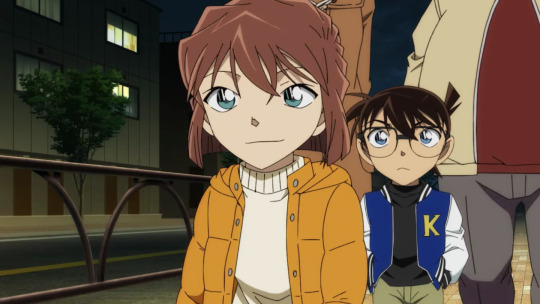








new ending dropped and i just about lost my mind
200 notes
·
View notes
Text
Was reading some articles about Kpop Demon Hunters and saw that there is a possibility for a sequel and I would like to add my two cents.
Listen. I understand the need for great stories like Kpop Demon Hunters. I also would like more, but I would also really like to just have a movie that did it's job, became beloved and ended. I was disappointed so many times by boring sequels that have nothing to do with the original idea, canceled shows and writing that makes you forget why you were a fan in the first place that I would genuinely be happier with this story just ending here, even tho there is definitely more to explore.
The idea that Kpop Demon Hunters might get a sequel or something of that sort doesn't excite me. My first thought is not "Oh my god, yes my girls will get more time to shine" but "What if they decide to just lobotomize all of them and undo all of the character development they went through because it's the easiest way to start a conflict?" I was so happy that there wasn't a plot point where Mira and Zoey are jealous of Rumi because she is the leader or something along those lines because there really is no need for that, but now I am in fear that after they went through so much and nearly died, the sequel would have them point fingers and yell "YoU arE alWAys tHE SPeCiaL ONe!" "WeLL It'S bEcaUSe I AM sPeCiaL" or some bullshit like that. I also don't want romance to become center of everything if we get the "Jinu is alive actually" plot. It was done greatly here but only because it wasn't the only thing going on. Both Jinu and Rumi had so much going on for them individually and could never be reduced to just romance (nor it was a point of the movie) and other characters, specifically Mira and Zoey, are not just some sidekicks who exist solely to complement Rumi and push her forward.
The only idea for a new movie that excites me is a story about Rumi's parents and her mom's group of Hunters (I need more on Celine!!!) but even that scares me because what if they pull "Yeah, Rumi's dad is actually Gwi-Ma and he was once nice but then something happened and his wife died and Celine is the actual villain and my baby boy is just misunderstood and he only turned all of these people into demons by using their worst fears and insecurities and made them his slaves because he was sad." My fragile heart can't handle such stupid plot anymore.
So many things can go wrong that I just want it to end here. This is very pessimistic and probably overly dramatic but I am really done with being disappointed with franchises for these (and many other) reasons. The love and passion for making great things expires quickly when money is involved and I don't have a reason to think that the same won't happened with Kpop Demon Hunters. At first you want to give people something that they would love and before you know it you are making a live action show after releasing movie number 7 (yes, each one is worse than the previous). Again, I am probably just overly pessimistic, but I don't trust these people one bit. Also it's just nice having something that doesn't answer every question. Make up your own version, it's fun.
#kpop demon hunters#kpdh#huntrix#the saja boys#jinu#rumi#mira kpdh#zoey kpdh#zoey kpop demon hunters#mira kpop demon hunters#rumi kpop demon hunters#rumi kpdh#jinu kpop demon hunters#jinu kpdh
45 notes
·
View notes
Text

Shattered Vows is live on AO3!
A Jon/Sansa post–Season 8 slow-burn with political intrigue, angst, and emotional wreckage galore.
This isn't a fix-it fic—it’s more like what happens when the dust settles and the vows made in war come back to haunt you. Heavy on the character development, tension, and the quiet ache of things left unsaid.
If you're into reluctant kings, haunted queens, and complicated love caught between duty and legacy—this one’s for you.
Summary:
After the fall of the Iron Throne, Jon Snow vanishes into exile. But Westeros isn’t done with him. As a second Aegon rises in Dorne and old powers stir, Jon—now Jaehaerys Targaryen—is pulled back into the game he never wanted to play.
Sansa Stark, ruling from the North, must face what’s left of a fractured realm and an unresolved bond that refuses to die.
Pairing: Jon Snow/Sansa Stark (Jonsa)
Rating: Mature
Tags: Post-Canon, Political Drama, Slow Burn Romance, Angst, Identity Crisis, Emotional Tension
Chapters: 13 so far — updates ongoing
Read here:
https://archiveofourown.org/works/59675068/chapters/152202664
#jonsa #shattered vows #jon snow #sansa stark #game of thrones fanfiction #asoiaf #post season 8 #fanfic rec #ao3 fanfic #slow burn #angsty fic #reluctant king #queen in the north #jon x sansa
#jonsnow#ao3#writeblr#ao3 author#ao3 fanfic#asoif fanart#jonsa#ao3 writer#artists on tumblr#asoaif#sansa stark#jon x sansa#jonsa au#jonsa fandom#jonsa fanfiction#jonsa fic#jon snow#game of thrones#asoiaf#a song of ice and fire#archive of our own#fanfic#fandom
30 notes
·
View notes
Text
Introducing... Storm Young
for consideration at @simsbyyelhsa's Love Island

NAME: Storm Young AGE: 20 LIFE STATE: Human ORIENTATION: Pansexual. EA has a way of resetting my defaults so mebbe doublecheck when you download her. Jealousy settings should be for woohoo only. HOME WORLD: Chestnut Ridge, currently based in SanMy TRAITS: Cheerful, Goofball, Perfectionist, Lazy, Outgoing ASPIRATION: Lady of the Knits CAREER: Fashion Model, unofficially a disability advocate (she's hard of hearing in her left ear) SIGNIFICANT SKILLS: Wellness and knitting are her two highest but nothing is above a Level 6. I don't have Lovestruck so if most of the other contestants have the Romance skill, please be kind and cheat her a little (I don't know how much it impacts success in love or not).
read more

what she is looking for in a partner
"Someone with a sense of fun but still a decent set of ethics! Models have a bad rep but really that's because our hours are long and our jobs high pressure - and with most of us being young and still developing our life skills, sometimes the stress just gets to us. In reality you gotta be professional and easy to work with to succeed in the industry, aaaand with travel I'm usually rooming with other models and have to juggle a lot of different personalities. So a good attitude is a must."
"I work hard but when I'm off-the-clock, I flop and have pretty low-energy hobbies. So I'm cool with someone who's more active and athletic than me but just don't expect me to match your pace, yanno? With my job I also travel a lot, so you gotta have a life of your own and not be dependent on me to recharge your social battery."
"Also as some smart women once said, "if you wanna be my lover, you gotta get with my friends." I may be young but I've been working since I was 15 and living away from home since I was 16, so I'm kinda the unofficial den mother of the younger girls. I have my own social circle and I'm a richer person for it, so don't cramp my style and I won't cramp yours."

misc facts
Second youngest of four children.
In this Watcher's universe, real world discrimination against sims (apart from rich versus poor, which is present in gameplay anyway) doesn't exist. So Storm realising that she was pansexual was merely met with "happy coming out or whatever, now go muck out the stables" by her dad 😅
She good-naturedly describes her style as "a little Y2K, a lot confused."
Being a model she can walk in heels, but generally limits them to her formal and party looks. She similar only wears make-up for those looks and prefers to let her skin "breathe" between gigs.
Along with her knitting set, she carries a large nail file in her bag to scuff up the soles of new shoes and make them easier to walk in for shows (old model trick).
Was scouted at a rodeo.
Took up knitting to keep herself occupied while on casting couches. While she has some practical skills due to growing up on a ranch, she dislikes exercise and prefers to maintain her shape through yoga.
lookbook












cc is: genetics (non default eyes, mouth preset, hair, eyelashes + nose shine in "skin details" and cleavage overlay in "face paint"), fingernails and some makeup, yellow sneakers in second everyday outfit, suit and shoes in formal look (shoes are also the same as in her party look) and hoodie in her cold weather look.
her cc lashes clash with rings so just be aware of that. also her hearing aid conflicts with earrings.
the only defaults i have are feet, but i'll remove them before i send you her zip, so there should be none. below is an unedited close up of her in cas so you can more easily match her eye colour.

TOU: I'm cool with outfit changes according to theme and her maybe borrowing some clothes from other contestants (she is young and still experimenting after all 😊), but please don't alter her hair, ethnicity, skin colour, body type nor any other type of genetics, unless it's to replace with your defaults. If there's a problem with anything, please contact me ❤️
Let me know if Storm needs to pack her suitcase, @simsbyyelhsa!

22 notes
·
View notes
Text
🏥 Interview with Yim (Code Blue)
Good day! Thank you for agreeing to answer our questions. How are you feeling today?
I'm doing quite well today. It feels like life is slowing down enough that I have a bit more time and space to recharge.
Let’s begin!
1. Could you tell us how you came up with the idea to write a story in the medical genre? Why did you choose to set the plot specifically in an emergency department?
I pitched several ideas for stories that didn't move forward, and I was encouraged to work on a medical story focusing on an EMS team. I proposed emergency medicine as an alternative because the scope of the medicine practiced there can be shallow or broad: it offers a lot of flexibility for writing. Patients often come and go from the department quickly, and their cases can be simple or very complicated, humorous or heartbreaking. The structure of work in the emergency department also seems well suited to work for a Romance Club story.
2. What inspired the storyline? Were there any particular films, series, or books that influenced you?
The storyline is the product of sitting with the subject matter for a while and considering what would be interesting and well-suited for an RC story. For inspiration, I primarily turned to television series, documentaries, and doctors’ memoirs, and also to the city of Seattle itself, where I lived for many years. I wanted to achieve a balance between the medical and romance aspects while keeping the visuals interesting. In terms of particular films, series, and books, as unlikely a pairing as it is, I think this story falls somewhere between Scrubs (which I enjoyed watching as a teenager) and The Pitt. Adam Kay's This is Going to Hurt and numerous other sources have influenced me.
3. Why did you choose this specific title for the story? Were there any alternative options?
For this story, I proposed the title "Vitals," which I liked because it applied to more than just the medical aspect, but it was decided that it was not interesting enough, so it was given the title that it has now.
4. How much time did it take you to develop the plot?
The very basic premise and plot were developed over the course of a month. There are many minor plotlines that will develop organically over the course of the story to support the higher-level plot, though.
5. Is it possible to combine two stat paths in the story, or is it better to focus on just one?
No, it's best to focus on just one.
6. How many seasons are planned for the story?
3
7. Let’s talk about the characters! What made you decide to give players the option to choose the protagonist’s gender?
I was offered the opportunity to do so, and I jumped on it, much like including diverse body types in Hell and High Water. I think it fits very well with a story like this, where it's an aspirational story (many people are curious about what it would be like to be a doctor) and the story's plotline is not heavily influenced by the choice of gender (while sexism certainly affects modern medicine in Seattle, it has much less of an impact than it might on a historical drama about a monarch, for example).
8. How challenging is it to write branching storylines from both male and female perspectives? Do you find it difficult or rather easy?
It's somewhat challenging and rather fun. As a non-binary person, I "played" the female perspective (poorly and miserably) for more than 20 years and often wondered what it would be like to "play" the male perspective, though that didn't suit me either. So, it's certainly something I've spent a lot of time thinking about and talking to people about. And there isn't any one way to be male or female in terms of how one experiences the world, but I hope to write something that is relatable to many people.
9. What key qualities do your main characters possess as professionals in the medical field?
I think that dedication is a vital quality that they all possess, even if they show it in different ways. Medicine is a very difficult field in the USA, even for those who have ample opportunity, and it is an enormous commitment. Along with this, they possess patience in all areas: with themselves, others, situations, and systems. Not all of the characters are equally patient, but they are all probably more patient on average than most people. Also, the ability to work well under pressure and focus.
10. How did you choose their names? Why did you settle on the ones featured in the story?
This is a good opportunity to talk about Tobias and Trinh's names. I've seen a lot of comments about these in particular because these names also appear in Open Heart, which I enjoyed playing the first season and a half or so of many, many years ago.
When I originally designed Tobias, he had a distinctive nose. I thought it gave him some more personality, but it was determined that this wasn't conventionally attractive enough, and it was ultimately changed. However, when I was young, one of my favorite characters was Tobias from Animorphs, whose form is a hawk. I have always had a soft spot for the name, and when I learned it suited Tobias's origins, I decided to call him that. I felt that he was a hawk-like character, keeping an eye on the department and having his distinctive nose.
Trinh is a very common last name in Seattle. I actually chose the name because I had a wonderful doctor with that surname, and it seemed like a nice way to honor them, though the nurse in the story and the actual doctor have nothing else in common.
In general, though, the names mostly depend on the character's origin. In some cases, they are names the characters chose for themselves
11. What was most important to you when visualizing the appearance of the main characters? Did they turn out the way you had envisioned?
For me, the most important thing about a character's visual design is that it reinforces their life experience and personality. (Sometimes, this means that they don't look anything like one would expect, because people have a way of surprising us). I have learned that my idea of what is attractive doesn't match with what most people want, so for the LIs, I try to adhere to conventions for the most part, or what is seen as conventionally attractive for a given archetype. I'm very glad that Flint and Kenedi seem to be well received, because these are characters where there was less pressure to make them look a specific way and I was able to invest more in their designs (though I obviously made them very conventionally attractive within their own domains due to the extensive negative feedback I received on HHW's character designs). And with Jules, I'm also very glad that the many variations are being positively received. I was going for a very specific look with them, which will probably make more sense as the story progresses.
Given the circumstances, I'm very happy with how the characters turned out.
12. How long did it take you to create their character briefs? How old are they?
I could not easily tell you how long it took to create the briefs because it's spread out throughout the creation process. When the story is first pitched, the main cast starts to take form and their design starts, but it's not until after outlining and, in some cases, writing begins that they are fully developed and ready to be brought to life by the artists.
For ages, in order of appearance, here are a few:
Jules: 30
Flint: 26
Nahome: 33
Kenedi: 30
Tobias: 44
Gutierrez: 27
Malinowski: 28
Gail: 37
Eugen: 29
Dakota: 27
13. Will players have the chance to change the characters’ uniforms again, or will the current ones remain as final?
There will be more work clothing options as the story progresses (and some seasonal accessories), but these won't be very common.
14. We’re curious to know more about the romance options in your story! How many love interests are planned?
There are 6 full romantic routes planned. There will also be some romantic interactions with other characters, such as Gutierrez, Malinowski, and characters we haven't met yet. I have already seen many comments on Gutierrez and Malinowski, and they are intended to be developed further, but they are not "main" LIs.
15. If you could describe each love interest in one word, what would it be?
I would describe all of them as "complicated."
More seriously, though:
Flint: Chaotic
Nahome: Healing
Kenedi: Uplifting
Tobias: Harrowing
Gail: Bittersweet
Eugen and Dakota: Playful
16. Why did you choose marine creatures as pets in the story? Would you like to have one of them yourself? Or maybe you already do?
I had a pet fish, Ruvi, who was very near and dear to my heart. I've kept a few bettas over the years, so I wanted to include one. And I hope that I might keep another in the future. This happens in the story is mostly because Annette doesn't really see fish as much different from plants, which unfortunately seems to be a pretty common view. To her, they're more of an aesthetic element. Jules definitely doesn't have the motivation to care for anything demanding at this point, and I didn't want to leave players with something like a cat or dog that would suffer much more while Jules is working hard.
17. Does your workspace mean a lot to you? What items are a must-have there? We'd love to see a photo!
My workspace is incredibly important to me, but right now it is very much a work in progress, so I won't be sharing it right now. My absolute must-haves are an ergonomic keyboard and active sitting chair.
18. Do you have any rituals before you start working (if any)? Maybe you need to grab a cup of coffee or spend a few minutes in silence?
Yes! I almost always start by grinding some beans and making a cup of coffee in my French press, and I usually finish my coffee before I actually start working. Often, I'll also play focus music while I'm working: it's usually just white noise pomodoros.
19. What lessons did you take away from your previous story, “Through Storm and Fire”?
I think if I wrote them all out, it would be a few thousand words, so I'll simplify my answer: I learned a lot about the expectations of players, what works well on the platform, what I can control and what I can't, and what resonates with who and what doesn't.
20. Describe your new story in one quote or phrase (maybe from a famous person?).
I think Hippocrates has a very relevant quote for this story:
"Wherever the art of medicine is loved, there is also a love of humanity."
Thank you so much for your thoughtful answers! We're really excited to learn more about the new story and about you! Wishing you continued success
Thank you for the interview, it was fun to share a bit about the behind the scenes of the story!
21 notes
·
View notes
Text
Well, I guess it depends on if you mean “the story ends with the murders solved and Shen Qingqiu alive,” or “never died at all in the process” because if it’s the latter it’s a bit more up in the air. But if he DID die, he wouldn’t stay dead—he cheated death a couple times in the story iirc (it’s been a little since I read the books).
As for whether or not he could solve it… I think he could, but only with some cheating from the system, and only if it ended with him in some yaoiful position where Luo Binghe has to bridal carry him or something. And not without complaining about it the full way through. He’s got encyclopedic knowledge of Proud Immortal Demon Way, but I’m going to assume that the Kira murders are a new plot development so not something he already knew the answer to. And he is a TERRIBLE judge of character, so I don’t think it would be hard to trick him into believing someone is/isn’t the killer.
This is all assuming you mean Shen Qingqiu (Shen Yuan) and not Shen Qingqiu (the guy from the in universe story), but considering the picture used I think it’s fair to say it’s Shen Yuan.
Sorry this is so disjointed, it’s kinda 50/50, and really depends on what you interpret as “solving the case” or “surviving.” Luo Binghe could though, and Shen Qingqiu would influence that outcome guarantee. Does supporting the solving of the Kira murders count?
Luo Binghe solving the murders would also end with yaoiing out btw that’s just what SVSSS is like.
Anyway, SVSSS is peak toxic yaoi I think about it at least once a week, usually more. SVSSS is a psychosexual thriller more than it is a romance
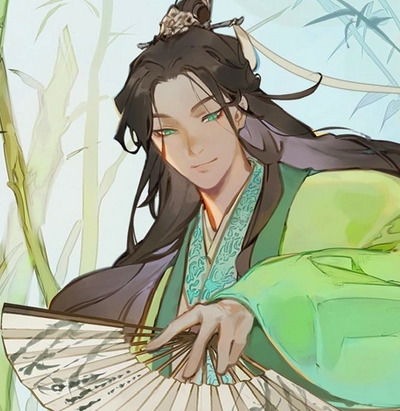
#svsss#peak fiction I’m not even joking#I wrote a several thousand word review of SVSSS#and i’d do it again
122 notes
·
View notes
Text
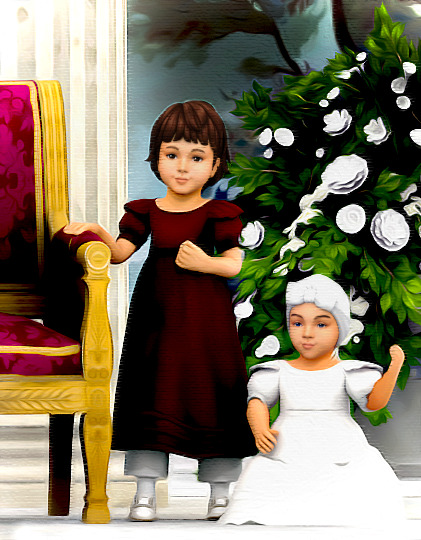
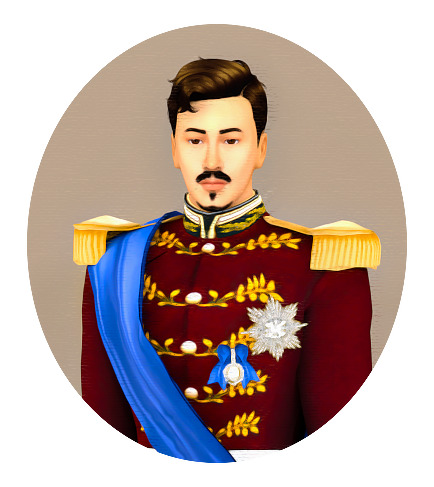
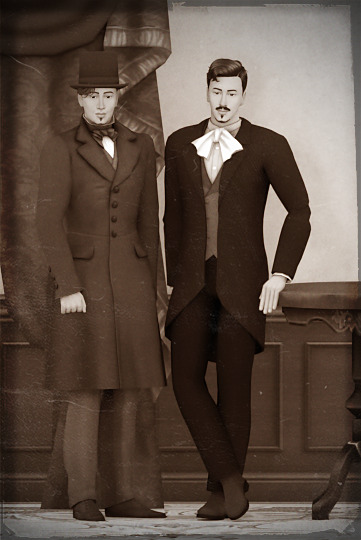
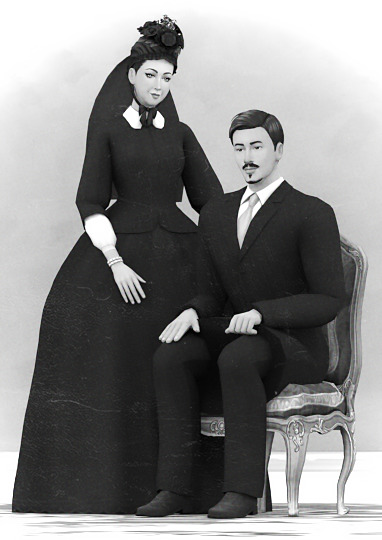
Prince Edward, Duke of Clivendale Part 1
Born on 7 November 1835 at San Myshuno Palace, Prince Edward Stephen Alexander Charles was the sixth child and second son of Queen Mary II of Windenburg and her consort, Prince Charles, 10th Earl of Statford. Known affectionately to his family as Eddy, he was, from birth, second-in-line to the throne, following his elder brother, Charles Edmund, Prince of the Isle.
His christening took place on 3 December in the palace chapel, officiated by the Archbishop of Devonshire, and attended by an array of distinguished sponsors. Among his godparents were Edgar Statford, 1st Earl of Lisburn (his paternal uncle), King Alexander I of Brichester, Prince Edmund, Duke of Burgundy (his mother’s first cousin), Princess Elizabeth (his maternal great-aunt), Crown Princess Ludovika of Tartosa and Charlotte Ponsoby, Duchess of Heathrow (his father's first cousin).
As the “spare,” Edward received significantly less attention than his elder brother. While Charles was admired for his intellect, discipline, and statesmanlike demeanor, Edward was viewed as the more impulsive and physically spirited of the two. Though the brothers shared an affectionate bond in their early years, rivalry and contrasting personalities gradually strained their relationship. Charles grew close to their older sister Charlotte and their younger sisters, Mary and Matilda.
Edward did not thrive under the rigorous academic curriculum his father had designed. Prone to emotional outbursts and frequent tantrums, he often found himself at odds with his tutors and at times with his father, who clashed with Edward’s sensitive nature. Yet, he excelled in athletics. A natural sportsman, he loved tennis, cricket, and rugby, the latter of which he popularized within Windenburg’s aristocratic circles.
The death of his father in 1847 marked a turning point in Edward’s life. Deeply affected by the loss, Queen Mary withdrew from public life and entered a prolonged period of mourning, retreating to Glencraig Castle and clinging fiercely to her children. The emotional vacuum left by Prince Charles’s death led Edward to seek purpose and discipline through service. Following in his father's footsteps, he joined the Royal Navy in 1848 after passing his entrance examinations.
Serving initially under his uncle, the Earl of Blythe, aboard HMS Rochester, Edward rose through the ranks with distinction. By 1855, he had captained voyages to the island country of Sulani, where he received a warm welcome from the royal family, distant kin of the Windenburg royals. Over the next decade, Edward visited more than twenty countries, developing a love for maritime diplomacy and his naval duties.
Despite his postings abroad, Edward made regular visits home. In 1862, he was knighted into the Order of King Edmund I and ennobled as Duke of Clivendale, Marquess of Linley, and Earl of Ely. That same year, he entered into a discreet romance with Lady Frances Gillard, daughter of the Duke of Beverly. The affair, though passionate, provoked scandal. Lady Frances was slated to serve as a bridesmaid at the wedding of Infanta Maria Christina to Prince Charles, Edward’s brother, until Queen Mary discovered the relationship. Viewing the affair as a threat to the Crown’s reputation, the Queen swiftly dismissed Frances from court and sent Edward back to sea in disgrace.
In 1863, Edward was reassigned to St. Julian, Windenburg’s island territory off the coast of Tartosa. There, he was promoted to Admiral in 1865. Though his naval career was distinguished, Queen Mary remained quietly disappointed, wanting Edward to start a family.
Seeking to repair his relationship with his mother, Edward agreed to entertain marriage proposals. In 1864, Queen Mary attempted to arrange a match between Edward and Princess Pauline of Weimar, daughter of her cousin, Princess Alexandra of Burgundy. The two met at Glencraig Castle, but their temperaments proved ill-matched. Subsequent suggestions included Princess Olga of Brindleton, Princess Louise-Marguerite of Magnolia, and Princess Catharina of Saxe-Dessau, but they yielded no progress.
While visiting Sunderland, Edward attended a reception where he met Princess Octavia of Glencairn, elder sister of King George I of Sunderland (@warwickroyals). A spark ignited between the two almost immediately, with Edward writing to his sister Ophelia that he was "madly in love" with Octavia the moment he met her. Over the weeks, a courtship blossomed, one built not on political convenience, but affection and shared values.
When Edward returned to Windenburg in July of 1864, he petitioned Queen Mary for her blessing. Though she harbored no affection for the Sunderlandian court, Mary reluctantly gave her approval, moved by Edward’s sincerity and determination. The real obstacle, however, emerged in Sunderland. King George I, fiercely protective of his sister and wary of Edward's scandalous past, refused to sanction the match. Despite weeks of negotiation and pleas by Octavia, George remained unmoved.
By February 1865, Edward and Octavia’s courtship had ended in heartbreak. Their letters, once exchanged daily, ceased. Edward withdrew from public life for months, devastated by the collapse of the only relationship that had ever felt both real and hopeful. Octavia, for her part, was said to have mourned the loss, never marrying.
#sims4#sims#legacy#royallegacy#royalty#ts4 royals#ts4#ts4 royalty#ts4 royal#ts4 legacy#sims 4 royals#sims 4 history#historical#sims4 history#ts4 history#sims 4 story#ts4 story#s4 story#royaltysimblr#sims 4 victorian
22 notes
·
View notes
Text
Continuing our own Machete order rewatch of Star Wars (Andor, Rogue One, IV, V, I, II, III, VI), my sister and I watched Empire Strikes Back and, yeah, it still holds up. Although, after the Battle of Hoth, there's not much Rebellion stuff in it. It's more focused on developing the main characters from the previous film. So, we see Luke's flaws while training with Yoda, Han and Leia's prickly romance, and, Vader ruthlessly choking any incompetent Imperial officer.
Interestingly, without its high command, we also get to see the Empire in its bare bones, just an old guy, his right hand and three ships filled with nervous space nazis. We finally meet the Emperor ("and his name is Palpatine!"), but he's not angry about his Death Star exploding, instead, he gleefully talks about making Luke to join him. This brings to mind a thought I had while watching Andor Season 2, inspired by Carro Rylanz saying the ISB was running a shadow government, not at all false. We do know Palpatine rules the Empire, but actually he doesn't care about the hows and whys, he just wants results (and more power). Of course, he's the big dictator, but, as we saw many times in Andor, all the oppression, racism, colonialism, torture, abuse, genocide, didn't just come from him. It came from the people that chose to do those things. All the moffs, generals, soldiers, etc, the Empire gave them a pass to be evil, and they accepted it.
I think it's important to acknowledge, like in any fascist regime, it's not just one person taking control of everything, they have followers. Like Syril, people that follow their Empire thinking it's righteous, but that somehow fail to see their crimes. Or Tarkin, who knows the Empire is evil and relishes on their acts of destruction.
And then there's Luke. He doesn't support the Empire, but learning Vader is his father, it's a huge blow to his identity. He realizes he's connected to the oppression of the galaxy, and even receives the offer to rule it with Vader. In despair, he lets himself go, choosing death (he doesn't die, but still).
#star wars#empire strikes back#andor#andor spoilers#star wars spoilers#ok#prequels next#the rise of the empire!#and sheev's!
21 notes
·
View notes
Note
Hello! I love your blog ❤️
I try not to get too deep into the fandom, because there's always some drama, conspiracy theories and depressing thoughts about the characters' fates. But I've been caught myself feeling anxious about the past Devil's Minion... They're my Roman Empire and I'm terrified that we won't see the development of their relationship in the past. While Eric and Assad have joked about their characters' tumultuous romance in future seasons, what about Luke, young Daniel and his story with Armand? I'm trying to reassure myself that Armand wouldn't break his taboo and turn Daniel into a vampire just out of spite. If Daniel pissed him off that bad he would just wrapped his guts around a chandelier and run away. There must be something more! A shared past, a long-lasting relationship and love. However, I'm still afraid that their story from the past won't be revealed or will be limited to a chase around the world and toxicity.
Sorry for my messy thoughts and bad English
Your English is fine :) And glad you like!!
Imho there are more than enough hints at past DM, and I absolutely DO think that we will get it all - but maybe in season 4.
This show is built on Loustat - and DM. No worries there. Like, Rolin Jones more than hinted at this at SDCC 2022... before the show even aired.
And no, I do NOT think for ONE moment that Armand really turned Daniel out of spite... "in" spite however... also, there is more afoot with Daniel there, you can count on it. We are heading into the "body switching" territory of the books at some point (they already set up Raglan James and have said they want to do that book) and Daniel will be right in the middle of it all I bet.
So. I do think you can relax into it, insofar that DM will come and will be revealed - puzzle piece by puzzle piece. And if Armand's backstory really will be part of season 4... then I would bet real money the DM story will be as well.
#Anonymous#ask nalyra#amc iwtv#iwtv#amc interview with the vampire#interview with the vampire#the devil's minion#armand#daniel molloy#devils minion
22 notes
·
View notes
Note
I have a question if that's ok! Just wondering if SebAshton/Mazlow was always the endgame when you started your series, or if it was an idea that popped up as you made more content?
Hi! Thankyou sm for your question! So Mazlow actually was an idea I had when I started making more content. In the beginning, I wasn't interested in doing romance stuff cuz I'm not that good at it but when I was eventually ready to, I was gunna make a whole new MC for Ashton.
But as the friendship progressed between him and Sebastian, it started to make sense that something would be there? Like they just fit and it wouldn't be out of the blue if I were to suddenly put them together. So I thought it seemed natural that they would develop feelings for eachother. 💕
21 notes
·
View notes
Text
Pick a gif intuitive Reading- What to expect during this Uranus Gemini transit?
Disclaimer: this reading is for entertainment purposes only. You have free will to make your life choices. Take what resonates and leave the rest. Thank you and enjoy your reading!
There are 4 piles to choose from. Take a deep breath and whatever number 1-4 pops in your head is your pile. You can also choose by seeing which gif resonates with you more.
Pile 1

Pile 2

Pile 3

Pile 4

Pile 1
- oh! I heard “getting shit done” you all are not playing at all when it comes to living the life you want. You all cut so many ppl out your life. You don’t even miss them either lol, it giving “we’re just strangers with shared memories now.” Lol. I keep seeing a bee so you are on the move constantly. Are some of you all business owners or thinking about owning one? I just get this vibe that you’re trying to build something that has an impact on your community. Your energy is very business oriented. If not owning a business then you’re just making serious life decisions. You might’ve had a go with the flow attitude, now you’re being more practical with your decisions. Yeah, I don’t even know have much to say because you’re so focused on getting yourself together, you’re not really focused on anything much. I am getting you will have 2 prominent relationships(platonic and romantic) during this transit.
Pile 2
- I love this energy so much lol. Y’all are about to have a time!! I hear “celebrate the fruits of your labor” okay so, this entire decade has been trash for you lol. It’s been one thing after another but you kept on going. The universe has seen your efforts and things will get better for you starting in 1-2 yaers. The rewards will be small that leads to bigger ones. I’m hearing you need to let that one toxic person that you know is toxic go. I feel this is a long time friend but their energy is sketchy. Very much have a Love-hate thing for you. They energetically block your blessings. Romance and fun dates will also be a theme. This is very much 5th house/leo energy. Also Libra vibes as well.
Pile 3
-not you all beefing with your family members😭😅. See, you’re older and wiser and have gotten fed up with toxic family members. They smile in your face but talk shit behind your back. You tried to be cordial but it’s driving you crazy. Speak your peace but I advise not to lose yourself in the anger. Channel it into a creative project. Your inner child is angry but your inner teen is feeling rebellious. For you, these next few years is doing the things you felt restricted to do when you were a child. Some of you grew up in deeply religious homes and you outgrew those beliefs. For others, I’m hearing different political beliefs with family as well. Yeah you’re changing your appearance too, I’m seeing you embrace this 90s grunge era lol. I just feel this fed tf up energy from you all
Pile 4
- similar to pile 3 with this teenage angst energy coming from you but it’s not as loud as pile 3. You guys are giving me to cool for school vibes. Yall are kind of petty but you like it 😭. Very sarcastic group. You all have this “whatever.” Attitude that you’re developing but it’s making ppl feel 2 types of ways:
-they think you’re dope asf and love this nonchalant attitude of yours. May unintentionally attract ppl to you. This is the energy of how new the people will view you.
-people who’ve known you for years will be shocked by this vibe from you. I sense you’re the type to overthink and worry about everything but now you’re going more with the flow. Very few will embrace this new you, others think you’re being lazy or going through a phase.
Either way, you’re not carrying what ppl think anymore and will start to have tho sarcastic ass energy about you lol. You do care though, just not letting it overwhelm you every 2 seconds.
Thank you! I hope you enjoy your reading! Follow, like, reblog if you want to see more of my content.
#astrology community#astrology#astrology content#tropical astrology#astro community#pick a card#astro placements#spartanseagoat intuitive readings
17 notes
·
View notes
Text
I was just complaining about Dandadan fans being weirdly against shipping but after seeing the BNHA fandom's behavior uh. i get it now.
#bnha spoilers /#i though it was kind of a joke that bakudeku shippers were delusional but i did not know they were that serious goddamn#accusing horikoshi of 'ruining ochako's development' and 'only making it canon to appease the dudebros'#do... do bkdk's realize they also engaged in bullying and online harassment?#and horikoshi has been hinting at deku and ochako's relationship since the start#i'm not really going to be like 'oh why would deku fall for his bully' since horikoshi weirdly makes deku a little too forgiving imo#its just more like. nothing those two have done together indicates romance. it indicates a genuine platonic bond but not romance#also. do people know they can just. ship noncanon ships? you mean to tell me yall were shipping bakudeku EXPECTING IT to be canon????
951 notes
·
View notes